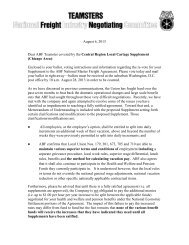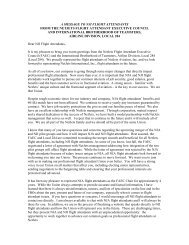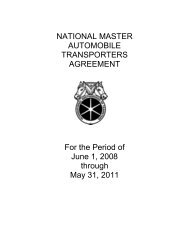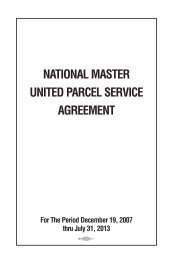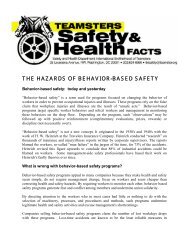October 2003 - International Brotherhood of Teamsters
October 2003 - International Brotherhood of Teamsters
October 2003 - International Brotherhood of Teamsters
Create successful ePaper yourself
Turn your PDF publications into a flip-book with our unique Google optimized e-Paper software.
Safety and Health<br />
Airlines Reject Security Training for Crewmembers<br />
Much-Needed Training Devalued by Airlines<br />
By Nancy Garcia, <strong>International</strong> Representative<br />
Flight attendants and flight deck crew don’t have an option when it comes to dealing with an<br />
emergency situation onboard an aircraft, whether it be fighting a fire in the cabin, aborting a<br />
take<strong>of</strong>f, opening an emergency exit or operating a defibrillator to save a passenger having a<br />
heart attack. Nor do they have the choice <strong>of</strong> opting out <strong>of</strong> emergency training, including<br />
hands-on or simulator training.<br />
The airlines, however, want flight attendants and pilots to be able to opt out <strong>of</strong> another<br />
type <strong>of</strong> training that will protect passengers and their own safety—crew<br />
security training.<br />
They have<br />
apparently<br />
forgotten all<br />
about September<br />
11 and why they<br />
just received $2.9<br />
billion from the<br />
federal<br />
government for<br />
security costs.<br />
Airlines have been lobbying Congress to make crew security<br />
training voluntary. They also want it to be unpaid and taken<br />
on the crewmembers own time. They have apparently forgotten<br />
all about September 11 and why they just received $2.9 billion<br />
from the federal government for security costs. With pilots<br />
locked behind the reinforced door and flight attendants left<br />
alone in the cabin to respond to a threat, crews need training to<br />
coordinate an appropriate response and flight attendants need<br />
additional training to defend themselves and their passengers.<br />
In mid-June, air carriers and the Air Transport Association<br />
(a trade organization made up <strong>of</strong> about 30 airlines) were successful<br />
in having an amendment attached to the Federal<br />
Aviation Administration (FAA) Reauthorization Act in the House<br />
that would weaken previously legislated security training<br />
requirements. This amendment was not included in the companion<br />
Senate Bill, therefore a Congressional Conference<br />
Committee met in July to work out compromise language.<br />
Unfortunately, the Conference Committee was unable to<br />
work out a compromise. Democrats on the Committee thought<br />
they would be negotiating a bipartisan report to reauthorize<br />
aviation programs, but when they got to the conference meeting,<br />
they found that Republicans purposely scheduled it at a time to prevent little or no debate<br />
on a report that bore little resemblance to either the House or Senate bills on several important<br />
provisions. The Democrats refused to sign the Conference Report, but it will, nonetheless,<br />
go to the floors <strong>of</strong> both the Senate and the House for a vote.<br />
The Conference Report guts the mandatory cabin crew security training requirements,<br />
making the training voluntary—all at a time when U.S. intelligence agencies are warning <strong>of</strong><br />
plans by the al Qaeda terrorist network to hijack more U.S. planes. The conference report further<br />
jeopardizes aviation safety by allowing the privatization <strong>of</strong> our air traffic control system. It<br />
also grants foreign cargo carriers a special interest exemption to evade cabotage laws by<br />
allowing point-to-point domestic service between Anchorage, Alaska and the lower 48 states.<br />
The Airline Division and the IBT Government Affairs Department are working diligently to<br />
defeat the Conference Report and to ensure that security training remains mandatory and that<br />
it includes the program elements necessary to prepare all crewmembers to respond to any<br />
level <strong>of</strong> threat on an aircraft. Their lives, and the lives <strong>of</strong> their passengers may depend on it.<br />
We will not let the air carriers and our legislators forget 9/11 and the lives <strong>of</strong> our fellow airline<br />
employees lost that day.<br />
8 <strong>Teamsters</strong> Airline Journal November <strong>2003</strong>



